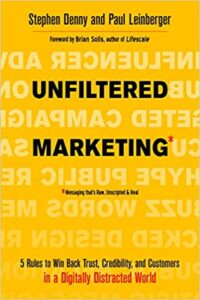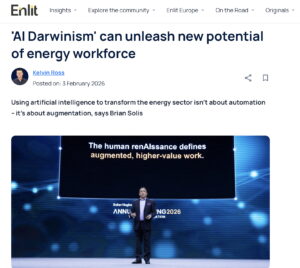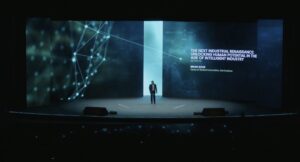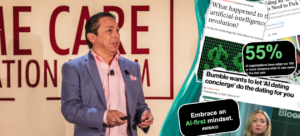
Brad Stallcup, Unsplash
My friend Stephen Denny asked me if I would write the foreword for his new book, “Unfiltered Marketing: 5 Rules to Win Back Trust, Credibility, and Customers in a Digitally Distracted World.”
It meant a lot to me. Having the ability to set the stage for someone’s passion and hard work is not something I take lightly. I asked if it would be okay to share the foreword upon release of the book and he said, “of course.”
Unfiltered Marketing shares big ideas that up level business strategy, marketing, and the future of the brand/consumer relationships. It is a playbook for managers and for anyone interested in the ever-changing interaction between technology and culture.

Foreword: May I Have Your Attention Intention Please?
Long gone are the days of brand style guides, messaging by committee, jargon, and communications and sales techniques.
Stephen Denny and Paul Leinberger are about to take you on a journey to win your trust. But before they can do that, they have to earn your attention. And, before they can do that, you have to believe that by giving them your time and focus, they will help you learn something so valuable, something you don’t already know or believe you need to learn, or that they offer something more compelling than you can figure out for yourself.
The only chance that they have to succeed in winning your trust is to be raw, unscripted, and real with you.
If you think about it, the same is true for the people you’re trying to engage in your work. If you’re reading this book, you probably have something to say or sell or teach. You’re hoping to reach a desired audience and help them understand that by connecting with you, they’ll be better for it. But ask yourself, why should anyone trust you? Why should anyone give you their attention or give you the gift of earning their trust?
If you take one more step down the rabbit hole, you’ll see that your audience is also hoping to reach their audiences.
And so it continues…
Everyone has something to say but very few believe they have something to hear. We live in a world where audiences have an audience of audiences. But what happens if no one is listening and everyone is talking? What happens when no one is learning and everyone is teaching? The answer is, nothing helpful or productive.
Somewhere along the way, we’ve all come to believe we’re entitled to an audience. The democratization of information, media, and connections introduced unprecedented power. But with that power should come great responsibility. Instead, we became enamored by access, reach, and reactions. We exchanged attention for distraction. We collected responses and followers like they were coins spilling out of a slot machine. We traded openness, compassion, and empathy for the illusion of popularity and influence. We became convinced that our audience was there to support our views and beliefs, lift us up, support us in times of need, and validate how we see ourselves and how we want others to see us. All of this became not only our new normal, but our life support system.
We weren’t ready.
All of this change came at considerable costs. Truth. Trust. Values. Leadership. Attention is now intentionally exploited. Facts are now debated with beliefs. Truth is now possessive—with truth lying in the eye of the beholder. Leadership is now dictated by misdirection, misinformation, and gaslighting. We live in a time, for better or for worse, when everyone knows everything. Everyone has access to the most accurate sources of information. Everyone is safeguarded by their truth. Tribes are formed around belief systems.
So, what do we have to learn? What do you have to learn?
Everything.
There are two ways to change behavior—you can intentionally manipulate it or you can inspire it. We see what the world looks like with relentless command and control all around us every day. To inspire it, takes honesty, and that honesty has to start from within.
To earn someone’s trust starts with intention, an intention to find common ground. That means you have to be willing to change and you have to know enough about someone else to learn how to add value.
For them to listen, for someone to let down their guard, to open a personal door to attention and ultimately connection, also requires a common language. To find common language, you have to discover alignment in personal values and aspirations. You have to identify and speak to their inner fire. You have to connect with who they are today and who and where they could be tomorrow. And, there has to be total alignment and agreement that together, directionally and fundamentally, you’re better and stronger than before.
To break the cycle of mediocrity, you have to shock the system with radical transparency and radical empathy.
This is a time to be real.
This is a time to be open.
This is a time to see and feel what you couldn’t before.
This is a time for raw, unfiltered, engagement.
Denny and Leinberger will take you on a journey of personal and professional transformation to help you help those who matter most. You’ll learn how to rehumanize engagement with an audience of audiences. The result is the cultivation of a more meaningful and productive community where trust, truth, and the value of connection thrive once again.
Now, may I have your attention intention please? Let’s turn the page and begin.
—Brian Solis
Digital Anthropologist, Optimist, Human Being and author of Lifescale
@BrianSolis
BrianSolis.com

Brian Solis | Author, Keynote Speaker, Futurist
Brian Solis is world-renowned digital analyst, anthropologist and futurist. He is also a sought-after keynote speaker and an 8x best-selling author. In his new book, Lifescale: How to live a more creative, productive and happy life, Brian tackles the struggles of living in a world rife with constant digital distractions. His previous books, X: The Experience When Business Meets Design and What’s the Future of Business explore the future of customer and user experience design and modernizing customer engagement in the four moments of truth.
Invite him to speak at your next event or bring him in to your organization to inspire colleagues, executives and boards of directors.





Leave a Reply